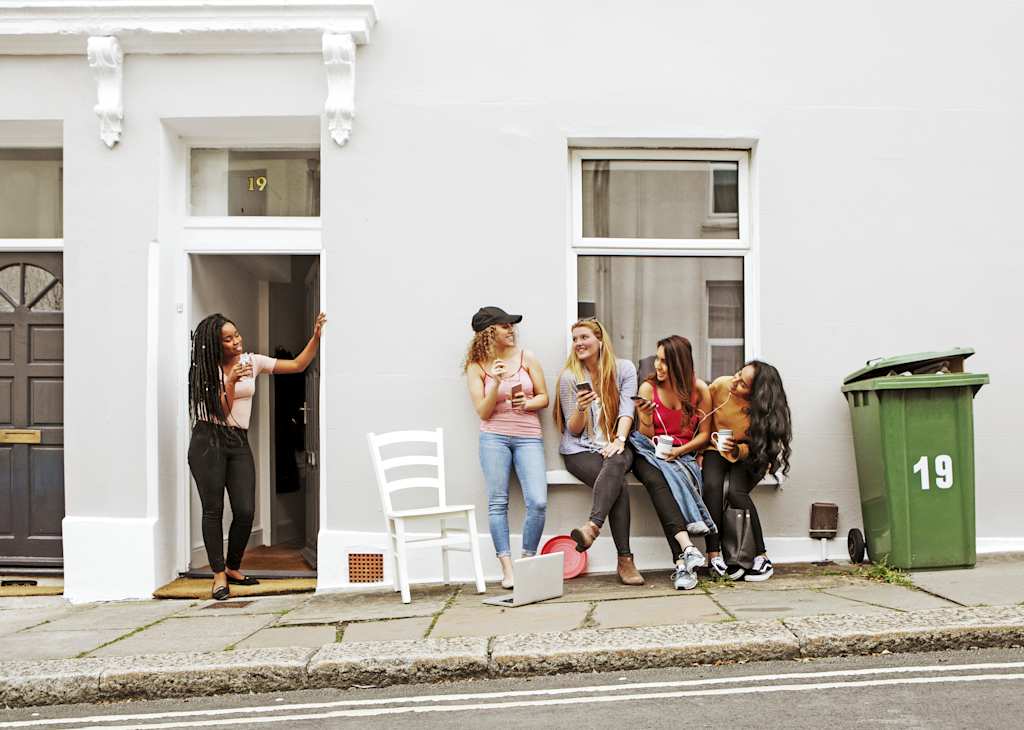
Mortgage rates are likely to stay in the 4-5% range this year but changes to affordability testing gives buyers a boost.

From saving for a deposit to getting your finances in order, arranging your mortgage in principle to securing your mortgage offer, we're here to guide you every step of the way.
We'll take you through the buying schemes available for first-time buyers to the amount of stamp duty you'll need to pay.
And we'll show you how to find the best mortgage rates and deals available for you.
1-year fix - unavailable
2-year fix - 5.7%
3-year fix - 5.57%
5-year fix - 5.32%
10-year fix - 5.75%
1 year fix - 5.28%
2 year fix - 5.45%
3 year fix - 5.23%
5 year fix - 5.02%
10 year fix - 5.34%
Get a quick idea of what you might be able to borrow for your next home.

Most lenders will let you borrow 4.5x your total household income.
The most important thing lenders look at when offering a mortgage is your monthly income.
The second most important thing is your monthly outgoings - and how much you can comfortably repay.


Most banks like a 10% deposit for the property you’re buying, though it’s possible to buy with a 5% deposit using the Mortgage Guarantee Scheme.
A bigger deposit is likely to open up lower interest rates and lower repayment costs, saving you money in the long run.
Get a quick idea of how much it's going to cost each month or how a rate change could affect your monthly payments.

Allow award-winning Mojo to show you the best rates available to you. A whole-of-market broker, Mojo work with over 70 lenders. And they won't charge you a penny for their services.

Tell Mojo about yourself and your situation so that they can get to know you, provide you with advice and ensure you’re eligible. It will take around 8 minutes.
Book a call and speak to one of Mojo's in-house mortgage experts, who will compare thousands of deals from over 70 lenders to find one suited to you.
Leave it with Mojo; the paperwork, the application, the bank poking and protection insurance, they'll handle all the stress. And if you’re remortgaging they could save you a lot of money.
You can approach any lender to get a Mortgage in Principle.
The amount each lender may allow you to borrow, in principle, may vary. So if your chosen lender offers you a lower borrowing amount than you’d hoped for, you may wish to get another MIP elsewhere.
You can approach as many lenders as you wish to find the best Mortgage in Principle for you, although it can be time-consuming to repeat the process with each lender.
A broker MIP isn't usually tied to one specific lender, so it will give you a more general idea of how much you can borrow.
Working with a mortgage broker can help to speed up the process and reduce the stress of manually getting lots of different MIPs from separate lenders.
They can also help if your credit rating isn’t where it ideally needs to be, you have income/affordability issues, a less straightforward employment history or are buying a unique property.
Work out how much you can borrow (1 week)
Get a mortgage in principle (1 week)
Find your home (12-24 weeks)
Lender valuation and survey (2 weeks)
Secure mortgage offer (2 weeks)
Solicitor conducts searches (6-12 weeks)
Pay deposit (usually 10% of home value)
Complete on home: solicitor handles the mortgage and the property is legally yours (1-2 weeks)

Work out how much stamp duty you'll need to pay on a property with our stamp duty calculator.

There are several schemes available to help first-time buyers into home ownership.
The mortgage guarantee scheme allows you to buy your first home with a 5% deposit.
Shared Ownership helps people on low incomes buy a stake in a home and rent the rest.
Deposit Unlock is a scheme launched by the house-building industry to enable you to buy a new-build home with just a 5% deposit.
The First Homes scheme offers 30% to 50% discounts on new-build homes to first-time buyers and key workers.
A Lifetime ISA tops up your savings by 25%, or up to £1,000-a-year, to help you save for a deposit.
The Help to Build: Equity Loan gives you a five-year interest-free loan to help you self-build a home.

Are interest rates going up or down? And what does this mean for mortgages? Get the latest.

Mortgage rates are likely to stay in the 4-5% range this year but changes to affordability testing gives buyers a boost.

The Bank of England has cut the base rate to 4.25%. Here’s how it will impact interest rates and the mortgage market, and what it means for your move.

27% of homeowners with a mortgage are on their lender’s standard variable rate. Could you be one of them?

First-time buyers accounted for more than half of all home loans in 2023 - and more than two-thirds teamed up to secure their own homes.

The first full week back after the new year has seen buyer interest jump out of the blocks faster than last year as mortgage rates drop. Get the latest with Richard Donnell.

95% mortgage guarantee scheme extended, 40,000 new homes to be built and Local Housing Allowance unfrozen to help renters on the lowest incomes.

Marathon mortgages, cutting pensions and raiding savings: how homeowners are coping as mortgage rates hover at their highest levels for 15 years.

42% of adults aged 18-39 who don’t own a home say they’ve given up on the idea of buying one in the next ten years, including 38% of those earning £60,000+.

The Bank of England’s latest increase adds a further £60-a-month to repayments for homeowners with a £200,000 variable mortgage.

As lenders withdraw some of their products, we take a look at what’s triggered the current turmoil in the mortgage market and what buyers and homeowners can do.

Core inflation rose to a new 31-year high in May, suggesting the Bank of England will have to increase interest rates by more than previously expected.

Leeds Building Society has teamed up with Experian to incorporate regular direct debit payments into credit scores for first-time buyers.
Buying a home is a big deal. From finding that perfect pad right through to exchanging contracts, we’re here to guide you every step of the way. Written in partnership with The Brain Charity to help neurodivergent folk with moving home.
We know getting your first mortgage can seem pretty complicated. So we’ve listed the questions we hear all the time.
What is a first-time buyer?
A first-time buyer is someone who has never owned or sold a residential property in the UK or abroad.
Even if you once inherited a property and sold it instantly without ever living in it, you'll no longer be a first-time buyer.
What does 'loan-to-value' mean?
Loan-to-value is the amount you’re borrowing for a mortgage, expressed as a percentage of the home's value.
If you have a £20,000 deposit for a £200,000 property, your loan-to-value is 90%.
The larger your deposit, the lower your loan-to-value. A loan-to-value of 60% or less will open up the best mortgage rates from lenders.
How do I get my first mortgage?
Get your finances ready
Compare mortgage rates and deals
Decide the length of your mortgage term
Agree on a monthly payment you can afford
Arrange your mortgage agreement in principle
Find the home you'd like to buy
Arrange your mortgage offer
What is the average mortgage rate for first time buyers?
The mortgage rates available to you as a first-time buyer will vary according to the price of the property you wish to buy, the amount of deposit you've saved towards it and your current financial situation.
Current 95% mortgage rates: 2-year fix 5.62%, 5-year fix 5.18%.
Current 90% mortgage rates: 2-year fix 5.45%, 5-year fix 4.85%
How long does a mortgage offer last?
A mortgage offer usually last for 3-6 months, although this can vary according to the lender.
If you don't buy a property within this time frame, you may need to ask for a mortgage offer extension.
What types of mortgages are there?
Getting a fixed rate deal with give you certainty on what your monthly outgoings will be, as the payments will always be the same.
Tracker mortgages, discounted tracker and standard variable rate mortgages all fluctuate inline with interest rates.
Offset mortgages allow you to link your savings to your mortgage to offset the interest on your mortgage.
What to ask a mortgage advisor when you're a first-time buyer
Can you compare deals across the whole of the mortgage market?
How many lenders can you access?
Are you regulated by the financial conduct authority?
What documentation will I need?
How much can I borrow and what size deposit do I need?
What's the best interest rate I can get?
What's the best type of mortgage for me?
How long should I fix my mortgage for?
Am I eligible for any home-buying schemes?
What are your fees?
What will my mortgage payments be on a monthly basis?
How long will it take to get my mortgage approved?
Which type of first-time buyer mortgage is best for me?
Only a professional mortgage expert can help you to answer this question.
They'll need to understand your income and outgoings, the amount you want to borrow, how long you want to pay it back over and what you can comfortably afford on a monthly basis.
You may want to 'fix' your mortgage, so that the payments stay the same every month for the duration of the deal, or you may want a discounted-rate mortgage, which can go up and down inline with the lender's standard variable rate.
There are lots of different types of mortgages available. Which one is best for you all depends on your personal preferences and financial circumstances.